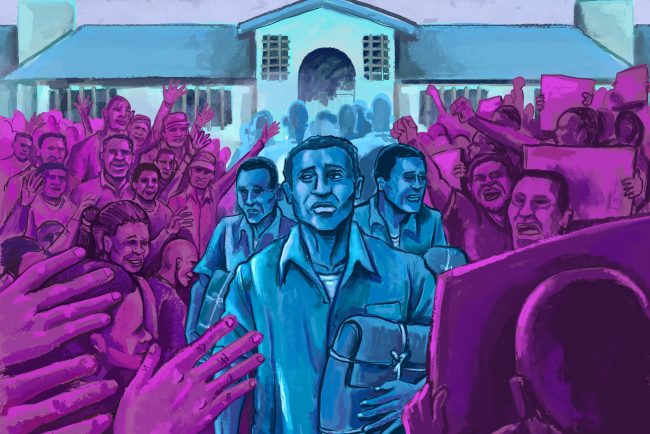Source: Zimbabwe Releases Prisoners in Amnesty Program, But Communities Worry About Safety – Global Press Journal
Zimbabwean presidents have granted over a dozen amnesties over 30 years to reduce overcrowding in prisons. But the lack of criteria raises questions about who is being released and why.
HARARE, ZIMBABWE — Peter Kansile says he was born in prison. His mother was incarcerated while she was pregnant with him, he says, because she killed his father and brother.
Kansile lived in children’s homes when he was young, then on the street from age 10. It was around that time, he says, that he began to break the law.
“I committed several crimes for which I was imprisoned several times,” he says.
Now 32, Kansile has been released for what he hopes will be the final time. He had served eight years of a 27-and-a-half-year sentence for stealing livestock when he was released in March 2018 under an amnesty granted by President Emmerson Mnangagwa, which freed those jailed for a number of crimes, including stock theft.
Today, he says he’s committed to making his living legally, and survives by trading clothes across the border with South Africa. “I am a changed person, and I believe in God,” he says.
Mnangagwa’s 2018 amnesty saw 3,000 people released from Zimbabwean prisons. The move has divided communities between those celebrating their newfound freedom and those who want offenders to serve their full sentences.
Yemurai is one of the latter group. She says that because of the amnesty, she now often runs into the man who raped and infected her 7-year-old daughter with HIV.
“I see him almost every day,” Yemurai says, who asked that only her first name be published to protect her daughter’s privacy.
Yemurai wants early releases to be stopped and for perpetrators to serve their full terms.
“These amnesties do not take into consideration the people that got offended or hurt, such as my family,” she says.
The right of a Zimbabwean president to issue pardons at their discretion is enshrined in the country’s constitution. The measure is designed to ease congestion in the prison system. Beneficiaries traditionally include women (excluding those imposed with the death penalty), juveniles, the terminally ill and prisoners who have served more than a quarter of their sentence. There are no formal criteria for release under an amnesty.
A dozen mass amnesties have occurred since 1980, said Assistant Commissioner Elizabeth Banda of the Zimbabwe Prisons and Correctional Service in a written statement to Global Press Journal.
“Amnesties have been helpful to correctional service in the sense that, apart from decongesting our institutions, it helps us ascertain how much society is prepared to accept offenders back into society,” she wrote.
In the past, amnesties have generally not included people imprisoned for sexual offenses, murder, livestock theft, carjacking, armed robbery or treason. But the 2018 amnesty was different. Those convicted of livestock theft, like Kansile, were released, as well as those incarcerated for rape and other violent crimes.
Pedzisai Ruhanya, a political analyst at the Zimbabwe Democracy Institute, says that by releasing such prisoners, as well as those imprisoned for political crimes, Mnangagwa was sending a message of tolerance in the months before the elections of July 2018.
Ruhanya says the release of Yvonne Musarurwa, a prominent activist for Zimbabwe’s main opposition party who was accused of killing a policeman, was a key part of that strategy.
For many, it’s the lack of clarity over how and why offenders are released that causes problems. Right now, prisoners are released based on the nature of their original crime or their behavior in prison, not on whether they have reformed.
Sekai Mandiyanike of Prison Fellowship Zimbabwe, an organization that supports people in prison, former prisoners and their families, says she is in favor of amnesties, but that the criteria for release need to be more consistent.
Mandiyanike says clemency should be reserved for those who have changed their ways.
“There should be assessment on individual basis [to] determine whether people have repented,” she says.
Leonard Wood, 38, says he was tried and sentenced for stealing livestock in 2012. His wife was also imprisoned after being found guilty of the same crime. Wood says the conditions in prison were dire.
“Life in prison was hard if you didn’t have anyone like a relative to help you with basics,” he says.
Wood says his mother came to the prison often to bring him essential items like toothpaste and soap. But he says the food was still inadequate for most prisoners.
“We would get a small portion of sadza with about eight beans in water soup to eat,” Wood says. Sadza, a cornmeal-based dish, is a staple food in Zimbabwe.
“Some suffered from malnutrition because of the poor quality of food,” he adds.
Wood’s wife got out early under an amnesty granted by former president Robert Mugabe in 2014, he says. But he had to serve four more years before being released under the amnesty granted by Mnangagwa.
As difficult as conditions were in prison, Wood says life outside isn’t easy, either. He’d planned to set up a chicken farm, but Zimbabwe’s crippled economy, in which most people struggle to find work that pays enough to cover basic expenses, made that dream impossible.
“So far, I have nothing to do, because of the prevailing economic situation,” he says.
Linda Mujuru, GPJ, translated some interviews from Shona to English.

COMMENTS
There is a possiblility that they are failing to cope with the prison population due to financial issues